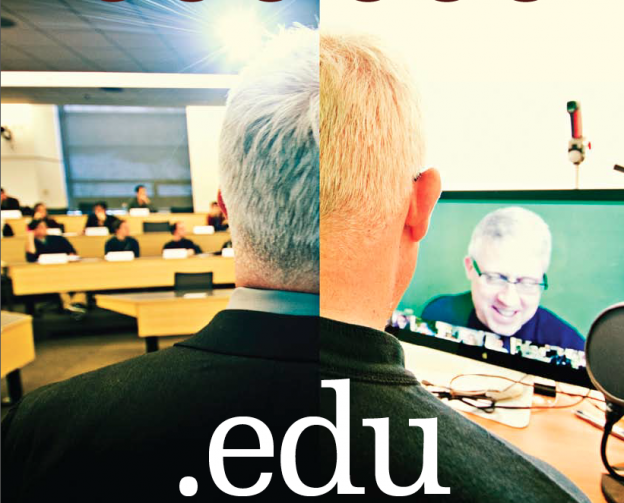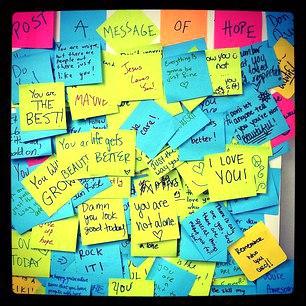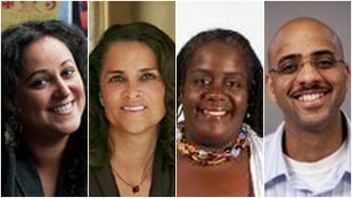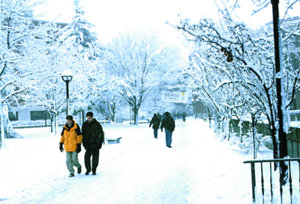When a professor receives a standing ovation from his students at the semester's end, he must be doing something right. And something rare as well: in the words of one student of Thurnau Professor of History Brian Porter-Szűcs, “the much deserved standing ovation was something I have never seen before or since.”
Porter-Szűcs certainly doesn’t win his students’ acclaim by taking on obviously popular topics. His courses on the history of Poland and the development of the Catholic Church, for instance, focus on subject matter about which many students report having had no prior interest or knowledge. And his courses often treat grim and difficult themes such as the effects of war and the moral complexities of major European social struggles.
 But as both students and colleagues report, Porter-Szűcs is beloved for his remarkable commitment to taking undergraduates seriously as intellectual interlocutors and key members of the History department’s academic community. In his undergraduate classes, he engages students as fellow thinkers by giving them primary documents along with a range of historical interpretations—often arguments with which he fundamentally disagrees—and asking them to come to their own conclusions. He uses class blogs to facilitate their interactions with one another’s analyses. And he inspires students to pursue their intellectual passions beyond the bounds of the classroom. Under his guidance as the department's first Director of Undergraduate Studies, the once-moribund History Club has grown into a vibrant intellectual community for undergraduate concentrators. And under his mentorship, a steady stream of students have proceeded to post-graduate study, many of whom who say they would never had thought of themselves as scholars before taking one of his courses. In short, students stand up and applaud Porter-Szűcs not because he entertains them but because he respects them as thinkers.
But as both students and colleagues report, Porter-Szűcs is beloved for his remarkable commitment to taking undergraduates seriously as intellectual interlocutors and key members of the History department’s academic community. In his undergraduate classes, he engages students as fellow thinkers by giving them primary documents along with a range of historical interpretations—often arguments with which he fundamentally disagrees—and asking them to come to their own conclusions. He uses class blogs to facilitate their interactions with one another’s analyses. And he inspires students to pursue their intellectual passions beyond the bounds of the classroom. Under his guidance as the department's first Director of Undergraduate Studies, the once-moribund History Club has grown into a vibrant intellectual community for undergraduate concentrators. And under his mentorship, a steady stream of students have proceeded to post-graduate study, many of whom who say they would never had thought of themselves as scholars before taking one of his courses. In short, students stand up and applaud Porter-Szűcs not because he entertains them but because he respects them as thinkers.
They do also admit, though, that he is an extraordinarily engaging speaker.






 In Fall 2011 I spent a day at Oberlin College as part of the Rackham-CRLT Intercampus Mentorship Program. My interest in the program stemmed from my own experience as an undergraduate student at a liberal arts college (Southwestern University in Georgetown, TX) and my eventual goal to become a professor at a teaching-focused university. I chose Dr. Jan Thornton as my mentor because of our shared interests in hormones and behavior, and Jan enthusiastically agreed to meet with me for a very full day at Oberlin.
In Fall 2011 I spent a day at Oberlin College as part of the Rackham-CRLT Intercampus Mentorship Program. My interest in the program stemmed from my own experience as an undergraduate student at a liberal arts college (Southwestern University in Georgetown, TX) and my eventual goal to become a professor at a teaching-focused university. I chose Dr. Jan Thornton as my mentor because of our shared interests in hormones and behavior, and Jan enthusiastically agreed to meet with me for a very full day at Oberlin. In line with U-M’s mission to develop internationally engaged and globally competent students, the Provost recently announced a new CRLT Grant for Internationalizing the Curriculum.
In line with U-M’s mission to develop internationally engaged and globally competent students, the Provost recently announced a new CRLT Grant for Internationalizing the Curriculum. But as both students and colleagues report, Porter-Szűcs is beloved for his remarkable commitment to taking undergraduates seriously as intellectual interlocutors and key members of the History department’s academic community. In his undergraduate classes, he engages students as fellow thinkers by giving them primary documents along with a range of historical interpretations—often arguments with which he fundamentally disagrees—and asking them to come to their own conclusions. He uses class blogs to facilitate their interactions with one another’s analyses. And he inspires students to pursue their intellectual passions beyond the bounds of the classroom. Under his guidance as the department's first Director of Undergraduate Studies, the once-moribund History Club has grown into a vibrant intellectual community for undergraduate concentrators. And under his mentorship, a steady stream of students have proceeded to post-graduate study, many of whom who say they would never had thought of themselves as scholars before taking one of his courses. In short, students stand up and applaud Porter-Szűcs not because he entertains them but because he respects them as thinkers.
But as both students and colleagues report, Porter-Szűcs is beloved for his remarkable commitment to taking undergraduates seriously as intellectual interlocutors and key members of the History department’s academic community. In his undergraduate classes, he engages students as fellow thinkers by giving them primary documents along with a range of historical interpretations—often arguments with which he fundamentally disagrees—and asking them to come to their own conclusions. He uses class blogs to facilitate their interactions with one another’s analyses. And he inspires students to pursue their intellectual passions beyond the bounds of the classroom. Under his guidance as the department's first Director of Undergraduate Studies, the once-moribund History Club has grown into a vibrant intellectual community for undergraduate concentrators. And under his mentorship, a steady stream of students have proceeded to post-graduate study, many of whom who say they would never had thought of themselves as scholars before taking one of his courses. In short, students stand up and applaud Porter-Szűcs not because he entertains them but because he respects them as thinkers.


